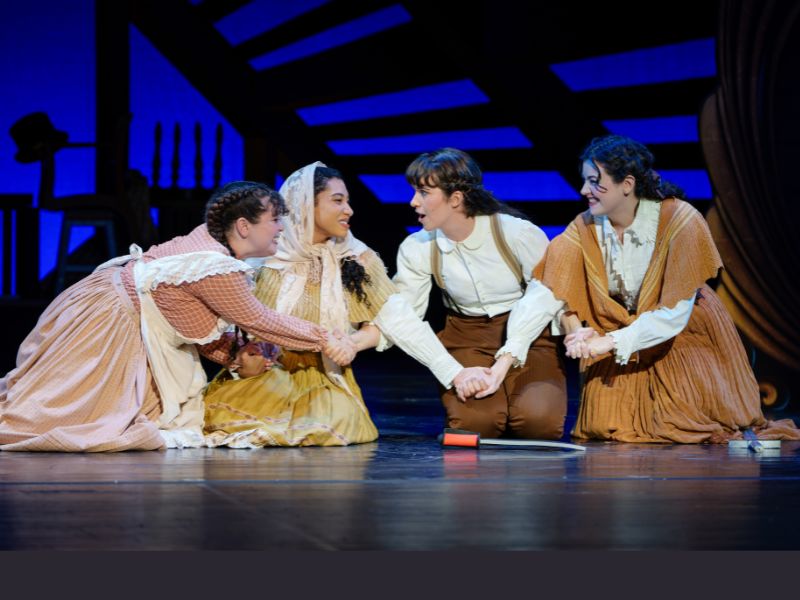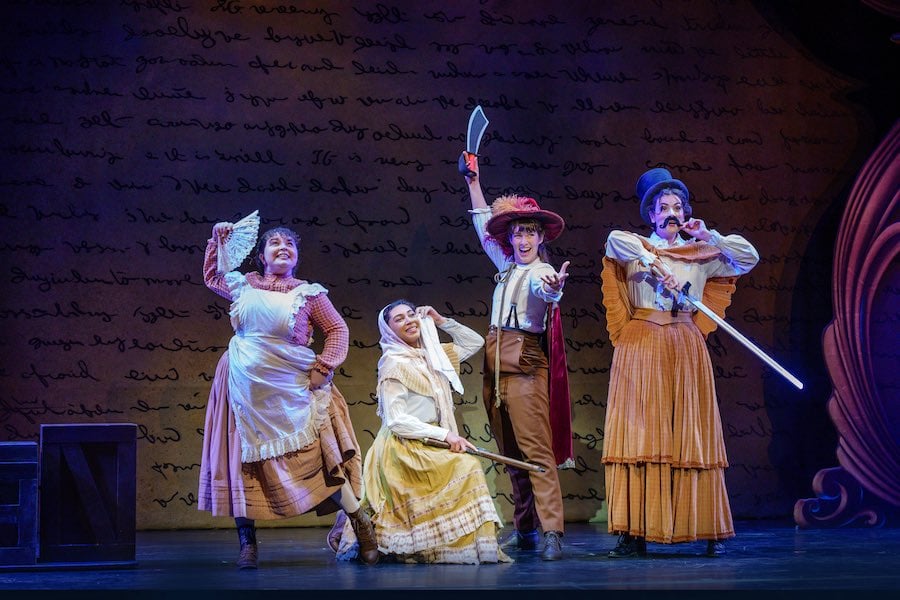Little Women: The Broadway Musical at Capital One Hall, directed by Jeffrey B. Moss (and featuring music by Jason Howland, a book by Allan Knee, and lyrics by Mindi Dickstein), reminds us that success and fulfillment in life can take different paths, and it is up to each of us to find and pave our own way. “Your fate is in your hands” is the line that encapsulates the journey of the main characters and resonates long after leaving the theater.

Drawing from Louisa May Alcott’s timeless 1868 novel, the production intricately weaves together themes of triumph, self-discovery, family bonds, and the pursuit of dreams. It follows the journey of four sisters—Meg, Jo, Beth, and Amy—as they mature into adulthood, each facing their share of growing pains. Meg, who initially struggles to accept a dance invitation, eventually receives a marriage proposal and faces separation. Beth, the angel who sees the best in every situation, must accept her fate and the brevity of life. Amy, the youngest and most entitled, aspires to enter society and enjoy the finer things in life. Jo, the protagonist, must find a way to achieve success through an unconventional route for a woman of her time. While their father serves as a chaplain for the Union army during the Civil War, they make friends with their neighbor, Laurie, and intermittently enjoy the company of Aunt March.
In Act I, Jo March, played exuberantly and buoyantly by Hannah Taylor, announces to her sisters in Concord, Massachusetts, “I’ve decided to become a world-renowned writer!” In the 1860s, a lady with such dreams usually had one hope of success: relying on a man. Her Aunt March, played amusingly by Moriel Behar, who also doubles as the boarding school owner, Mrs. Kirk, reminds Jo in the number “Could You” that she needs to master feminine wiles to secure a good marriage and thereby attain “power” in society. “You could never bend your will… Could you possibly be shy? Could you wear a corset tight in the heat of mid-July?… these are things a girl must do when she has dreams she must fulfill,” Aunt March sings instructively. Initially, Jo promises to “change” as Aunt March advises. However, the changes she undergoes over the course of the play lead her toward her true self rather than away from it.
Jo’s first change is to admit that she is nonconforming: “To hell with society! We do not live for society; we live for what is inside of us!” At this pivotal moment, she realizes that she has to find a way to be “astonishing” without her aunt’s support or the crutch of marriage. When told that the subject of an opportunity was closed, she responds, “The subject is not closed, and if it is, I open it up again!” Taylor, as a defiant and passionate Jo, exclaims that she will fulfill her dreams no matter the cost. And she does. When 22 publishers close their doors to her, she doubles down and breaks the next one down: “So I grabbed a story to sell and got ready to raise hell …. then he ordered four more, now I’m writing for The Weekly Volcano Press.” Jo, who initially refused marriage, is open to it after achieving success as a writer. In “Small Umbrella in the Rain,” sung with Professor Bhaer (played by Mychal Leverage), she negotiates the terms of their union: “I won’t be sweet, won’t be demure…. I’ll speak my mind, you can be sure.” Bhaer is okay with it because, unlike for Aunt March, it is Jo’s world, and everyone else is just living in it.
Jo’s other sisters also make their own way as the play progresses. Noa Harris playing the youngest sister, Amy March, does an exceptional job portraying an entitled brat. In Act I, upset that Jo does not give up her ticket to the ball, she throws Jo’s writing into the fire and immediately performs her own dance of glee, raising her dress and prancing across the stage smug with delight at her evil deed of retribution. Harris’ acting is so convincing that when she later has to face the consequences of her actions, she evokes pity by crying out, “My time will never come! I will always be forgotten and last. I just want something that’s mine.” Anyone who has ever felt relegated, left behind, and unseen undeniably empathizes with Amy’s childish yet valid emotions. However, things take an unexpectedly grand turn for Amy when she receives an invitation to travel to Europe and live her dreams of finer things. In Act II, Amy returns from Europe not only as a fiancée but, thanks to talented Costume Coordinator Janine Loesch, looking elevated and dazzling in a multicolored patterned dress with gold trimming. Even Theodore Laurence III, “Laurie,” played by Aathaven Tharmarajah, looks upgraded and grown in his blue suit.
Beth, portrayed with quiet grace by Camryn Hamm, finds solace in her music and forms a touching bond with Mr. Laurence, played at first with a “hard face” and later with warmth by Chris Carsten. Hamm’s performance captures Beth’s gentle spirit and profound resilience, particularly in her last moments with Jo in the very touching number “Some Things Are Meant to Be.” She sings beautifully, “All my life I’ve lived for loving you. Let me go now.”
Meg March, played by Rachel Pantaazis, has a beautiful and fast romance with Laurie’s tutor, Mr. John Brooks (played by Tristan Caldwell). There is not much to note here because most of it develops off-stage.
Aaron Bower delivers a standout performance as Marmee March, imbuing the character with quiet strength and unwavering resolve amid the turmoil of the Civil War. Dressed in black for almost the entirety of the play, Bower’s portrayal captures Marmee’s poignant solos reflecting on the challenges of single-handedly raising her daughters. Later in Act II, Bower sings “Days of Plenty” passionately. Refusing to lose two daughters (one to scarlet fever and the other to grief), she sings to Jo with so much emotional fervor that her voice and body tremble: “You can’t let this defeat you. I won’t let this defeat you! You must fight.”

Lighting Designer Charlie Morrison and Sound Designers Anthony Lopez and Chase Nichter all do a superb job. Except for minor hiccups with Meg’s mic, the sound effects, orchestra, and stage lighting for each musical score, including Jo’s operatic tragedy, are loud, on cue, captivating, and draw you into the action happening in the background while the play itself occurs in the foreground.
Randel Wright’s opulent yet minimalist set design provides a visually striking backdrop for the production: a structure of gold relief carvings similar in style to ancient Corinthian architectural capitals with five circles through it. However, despite its beauty, it detracts from the immersive experience by placing key settings in the background. For example, the family’s living room with the piano and the fireplace and Jo’s attic are all in the background (behind the structure) while the characters do most of the acting in the foreground (in front of the structure). When they are outside the house, we get a projection of a façade of a house overlaid on the relief structure itself. The musical could be better enhanced with a more intimate and immersive set design, allowing for a deeper connection to the characters and their journey.
Running Time: Two hours and 30 minutes including a 15-minute intermission.
Little Women played May 17 to 19, 2024, at Capital One Hall, 7750 Capital One Tower Road, Tysons, VA.
The program for Little Women is online here. The national tour website is here.
SEE ALSO:
Broadway in Tysons returns to Capital One Hall for 2024/25 season (news story, April 25, 2024)



